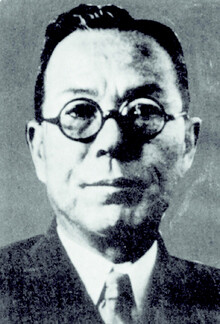hankyoreh
Links to other country sites 다른 나라 사이트 링크
Dong-A Ilbo founder was Japanese collaborationist, court confirms

By Hwang Chun-hwa
A court recognized that the founder of the Dong-A Ilbo engaged in collaborationist activities in cooperation with Japanese colonial rule.
Kim Sung-soo (1891-1955), also known by the pen name of “Inchon,” was found to have urged participation by Koreans in military and labor conscription as leader in a major extragovernmental body for the Japanese colonial administration.
The fifth administrative division of Seoul Administrative Court delivered the ruling Thursday in a case filed by Kim’s great-grandson Kim Jae-ho, the newspaper’s 47-year-old current CEO, against the Minister of Public Administration and Security (MOPAS) demanding the cancellation of a ruling classifying the founder’s activities as pro-Japanese and anti-national.
In its ruling, the court said two of the three charges applied to Kim Sung-soo represented collaborationist activities in terms of provisions in the Special Act for Investigation of Anti-National Activities During the Japanese Colonial Period for classifying actions as pro-Japanese.
The court did not accept the argument that Kim was forced into working on behalf of the empire but did not actively contribute to collaborationist activities.
“During the period from 1938 to 1944, [Kim] contributed pieces to the Maeil Shinbo urging a focusing of energies on victory in the Japanese empire’s war of aggression while working as a founder, director, councilor, and member of the Korean League for the General Mobilization of the National Spirit and Chosen League for Concerted National Power,” the court noted.
“It is difficult to believe that these merely carried his name under the pressures of Japanese imperialism, and there are considerable grounds for believing that he actively cooperated with Japanese imperialist colonial rule and war of aggression in terms of his specific actions,” it added.
The Korean League for the General Mobilization of the National Spirit was the largest wartime official organization, with the aim of mustering Korean people and material resources as the Japanese war of aggression expanded in the wake of the Sino-Japanese War.
The court also noted that Kim attended discussion meetings between 1942 and 1944 on gatherings to express appreciation and congratulations for the draft implementation and contributed a number of writings for the Maeil Shinbo praising conscriptees and student soldiers and presenting propaganda.
“It is difficult to believe that the writings were all falsified or forced, as some were printed with photographs, and they therefore qualify as pro-Japanese, anti-national activities,” the court said.
Regarding the plaintiffs’ submission of a collection of Kim’s writings as evidence to support their claims, the court said, “This was published by the plaintiff‘s foundation, which shares his interests, and as it differs in many respects from objectively verified actions by Kim Sung-soo and the facts, it cannot be trusted completely.”
But the court also said there was no specific evidence to support contentions that Kim was selected as a collaborationist group member in 1941 to spearhead a campaign for integration of Korea with Japan and imperialization.
The Presidential Committee for the Inspection of Collaborations for Japanese Imperialism designed Kim in 2009 as a person engaged in pro-Japanese, anti-national activities based on the determination that he had contributed to collaborationist activities. Kim Jae-ho objected to the claims and filed the administrative lawsuit in January 2010.
Please direct questions or comments to [englishhani@hani.co.kr]
Editorial・opinion
![[Column] Park Geun-hye déjà vu in Yoon Suk-yeol [Column] Park Geun-hye déjà vu in Yoon Suk-yeol](https://flexible.img.hani.co.kr/flexible/normal/500/300/imgdb/original/2024/0424/651713945113788.jpg) [Column] Park Geun-hye déjà vu in Yoon Suk-yeol
[Column] Park Geun-hye déjà vu in Yoon Suk-yeol![[Editorial] New weight of N. Korea’s nuclear threats makes dialogue all the more urgent [Editorial] New weight of N. Korea’s nuclear threats makes dialogue all the more urgent](https://flexible.img.hani.co.kr/flexible/normal/500/300/imgdb/original/2024/0424/7317139454662664.jpg) [Editorial] New weight of N. Korea’s nuclear threats makes dialogue all the more urgent
[Editorial] New weight of N. Korea’s nuclear threats makes dialogue all the more urgent- [Guest essay] The real reason Korea’s new right wants to dub Rhee a founding father
- [Column] ‘Choson’: Is it time we start referring to N. Korea in its own terms?
- [Editorial] Japan’s rewriting of history with Korea has gone too far
- [Column] The president’s questionable capacity for dialogue
- [Column] Are chaebol firms just pizza pies for families to divvy up as they please?
- [Column] Has Korea, too, crossed the Rubicon on China?
- [Correspondent’s column] In Japan’s alliance with US, echoes of its past alliances with UK
- [Editorial] Does Yoon think the Korean public is wrong?
Most viewed articles
- 1‘We must say no’: Seoul defense chief on Korean, USFK involvement in hypothetical Taiwan crisis
- 2N. Korean delegation’s trip to Iran shows how Pyongyang is leveraging ties with Moscow
- 3Amnesty notes ‘erosion’ of freedom of expression in Korea in annual human rights report
- 4‘Weddingflation’ breaks the bank for Korean couples-to-be
- 5[Reportage] On US campuses, student risk arrest as they call for divestment from Israel
- 6[Column] Park Geun-hye déjà vu in Yoon Suk-yeol
- 7Korea sees more deaths than births for 52nd consecutive month in February
- 8[Editorial] New weight of N. Korea’s nuclear threats makes dialogue all the more urgent
- 9Will NewJeans end up collateral damage in internal feud at K-pop juggernaut Hybe?
- 10[Guest essay] The real reason Korea’s new right wants to dub Rhee a founding father